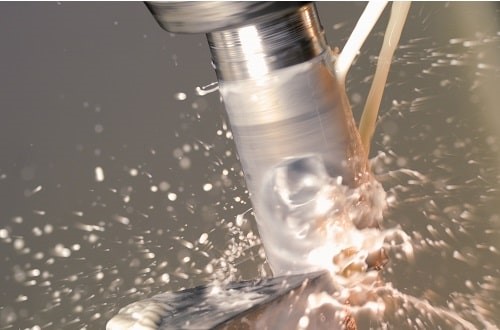More than half of manufacturing businesses that use metalworking fluids are failing to adequately protect employees, inspections carried out by Health and Safety Executive (HSE) have shown.
News
Businesses are failing to protect workers from dangers of metalworking fluids
HSE began inspecting businesses working with metalworking fluids in October, as part of a six-month campaign to improve safety. It will continue carrying out spot checks until the end of March. So far, says HSE, more than half of the inspections it has carried out have identified failings.
Exposure to metalworking fluids, also known as white water, can be harmful to the lungs and skin following exposure. Companies are required by law to carry out health checks on employees who are exposed to these substances. However, many of the firms inspected by HSE had failed to check employees for signs of lung and skin conditions.
 Exposure to metalworking fluids can be harmful to the lungs and skin following exposure. Photograph: iStock
Exposure to metalworking fluids can be harmful to the lungs and skin following exposure. Photograph: iStock
Poor performance was also recorded around the control of metalworking fluids in businesses that use computer numerical control (CNC) machines, says HSE. Local exhaust ventilation (LEV) should be fitted to CNC machines, in order to carry away harmful metalworking fluid mist.
"Our inspections found that there are still far too many businesses which do not have key control measures or health surveillance in place," said HSE inspector Fiona McGarry. "As a result, enforcement action is being taken against these manufacturers."
HSE has created an online quiz in an attempt to raise awareness of the dangers of exposure to metalworking fluids and improve knowledge in this area.
 HSE inspector Fiona McGarry:"Our inspections found that there are still far too many businesses which do not have key control measures or health surveillance in place." Photograph: HSE
HSE inspector Fiona McGarry:"Our inspections found that there are still far too many businesses which do not have key control measures or health surveillance in place." Photograph: HSE
HSE statistics on work-related ill-health and workplace injuries for 2022/23 show that 12,000 people die each year from lung diseases linked to exposure to hazardous substances in the workplace. A further 19,000 new cases of breathing and lung problems are thought to have been caused or made worse by work.
The manufacturing industry, says HSE, has a "substantially" higher-then-average rate for occupational asthma.
"Lung problems and irritated skin don't have to be associated with working with metalworking fluid if you take the right precautions," said McGarry.
NEWS

Manufacturers call for full implementation of Mayfield Review to tackle UK sickness crisis
By Belinda Liversedge on 26 February 2026
Trends in wellbeing and long-term ill health are “worsening with the size of the problem growing, not shrinking,” the UK’s manufacturing association Make UK has warned.

Employers unprepared for menopause duties, research suggests
By Belinda Liversedge on 24 February 2026
Most employers remain uncertain about duties coming into force to support female workers undergoing the menopause, a new poll suggests.

Ramadan: what employers should know about supporting their workforce
By Belinda Liversedge on 18 February 2026
As Ramadan begins this week, UNISON has reminded employers to think about reasonable adjustments for their Muslim workforce’s religious observance such as fasting, prayers, and flexible schedules.



